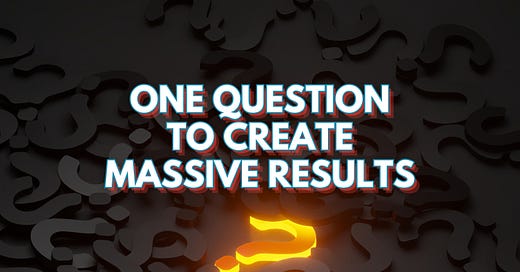I recently ran a peer coaching workshop with a group made up of what I’ll loosely call leadership in the world of change-making. Climate, racial justice, politics, etc.
In this workshop, I shared some pre-work around sitting in the coach’s seat with a friend or colleague, and the 7 questions from Michael Stanier’s brilliant book.
The pre-work is important. A coaching mindset is one of the keys to effective leadership. When your team, or family, feels at their core that you are rooting for them, they do better, take measured risks, and are excited to show up for you and for themselves.
The mindset in the coaches seat is just as important. Being “open” is a vague guideline and understanding specific things you can do to allow opportunity in is so important.
That said, today I’m going to expand on how important the last question is.
I’d love for you, dear reader, to find ways to bring this into your own conversations.
THE CLOSING QUESTION IN TRANSFORMATIVE CONVERSATIONS
The question Michael and so many coaches ask at the end of a conversation is:
What was valuable for you in this conversation?
THE PROBLEM
There’s a mental block here. In many ways, this can feel like you’re fishing for compliments. “Tell me why this was awesome” can feel like you’re asking for praise. Much like a conversation about money, there’s risk. What if they say it wasn’t valuable? What if they don’t have an answer at all.
THE SOLUTION
Minsdet shift: you’re gathering information and all information is good. This isn’t your last conversation, right? So learn from this and apply it next time.
WHAT YOU MIGHT LEARN
If they say it wasn’t valuable, that’s good for you to reflect on. Maybe they’re not a fit? Maybe you have ways to improve as a friend, colleague, or boss.
If they don’t have an answer, also good to know. They may need more support, more reassurance that it’s a safe conversation.
A follow up question in these two cases is “What would be a more valuable outcome for this kind of conversation?” or “What would you like to have gotten that you didn’t get today?”
Finally, if they DO find value and can name it, this is a tool for THEM as much as feedback for you. By reflecting on a conversation and pulling out their major takeaways, it helps them remember and more likely to stay committed. If they remember and stay committed, they will be more successful in their journey.
WHEN TO USE THIS
You can use this in a variety of conversations to uplevel outcomes.
Peer coaching is certainly one.
Learning environments.
Today I had a private lesson with my jiu jitsu instructor, and at the end he offered a summary of what we went over, and I got to say what I was excited to work on from our lesson in the following weeks. Now it’s locked in for me to practice.
Personal conversations.
We’ve all had those deeper conversations with friends, partners, colleagues, parents, kids. Play with the language depending on context. In a recent conversation with my wife we had a wonderful talk that has historically been a difficult topic. I asked, “I’m feeling really good about this talk, what do you think made it work?”
Business environments.
If you’re doing it right, your work environment IS a learning environment. Just like my jiu jitsu example, it’s great to ask yourself after a conversation with your boss or coworkers what the big takeaway was.
AND you can 360 that question. Say you have that great conversation with your boss. Imagine asking THEM, “Thanks for this talk. What are you taking away from the conversation?” You might get some really interesting meta feedback on your performance, presentation, or even areas where you have room to grow.
CHALLENGE
Think of a conversation you will have in the next week where you can use some form of this question. Leave a comment, what’s the conversation (in as much or little detail as you wish).
Paid subscribers will see an exclusive audio below on 3 benefits to this question and how to use it in everyday conversation.
Thanks for being a paid subscriber!
Some more insight into how to use these questions in your every day!




